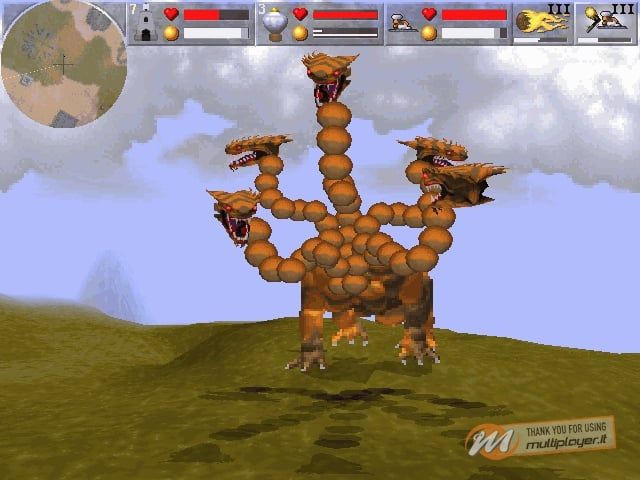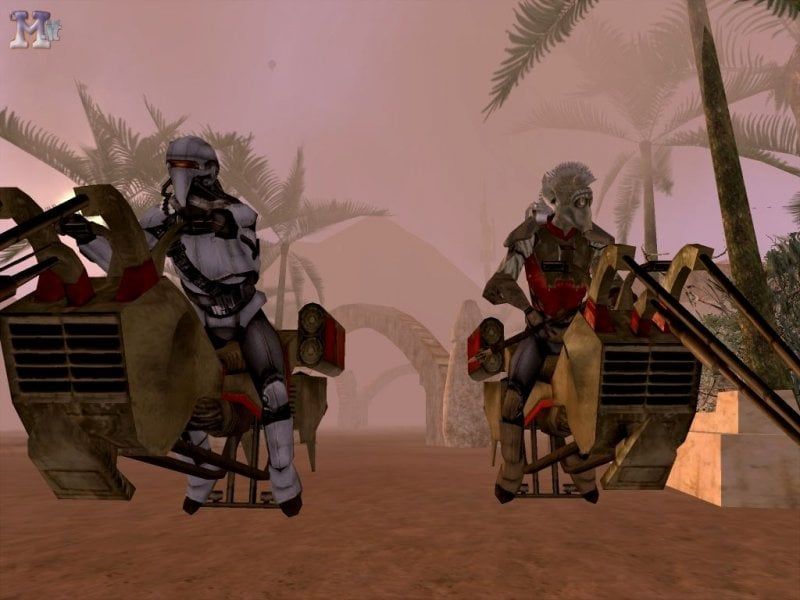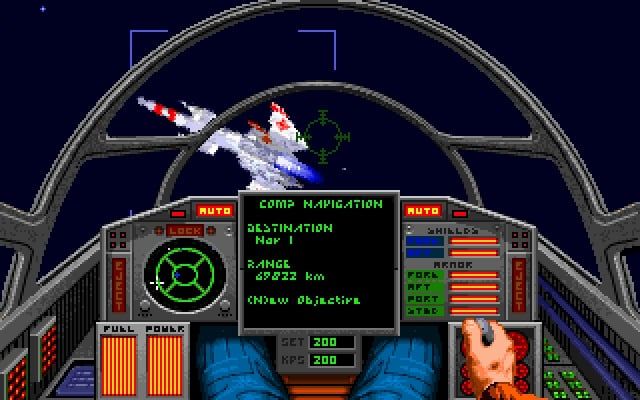PC and console have always been separate worlds: different games, different interfaces and postures. Even today I remember the jubilation of installing and trying Joe & Mac 2, a mediocre platformer that had the sole merit of offering horizontal scrolling on PC finally worthy of its console equivalent. On consoles you had arcade, arcade experiences, lighter and often more spectacular but you could only dream of the best graphic adventures, strategic games, space simulators. Even FPS, first-person shooters, were born on PC and only much later, with Goldeneye and Red Faction, but above all with Halo, were they able to find their space on dedicated hardware too. Then there was a moment when consoles started to win. It was around 1995, between LucasArts’ The Dig and Psygnosis’ Destruction Derbythat the PC began to feel the breathing down its neck of these increasingly powerful and specialized gaming machines.
History rewritten
If from 1995 to 2000 the PC could still guarantee a unique offer, in 2005 things changed radically. In ten years, thanks to the incredible success of PlayStation and the entry of Microsoft as the third player in the console market, the typical PC game almost completely disappeared. Now too risky to package and distribute in stores, and without yet a consolidated online distribution channel; strategic games like adventures, simulators and deeper RPGs are slowly disappearing from the radar. Fortunately, Steam arrived in 2004 and started a new revolution whose effects are still clearly visible today, but that’s another story.
Video games are starting to become mainstream thanks to consoles, and millions of new fans have consequently grown up in the reassuring shadow of Miyamoto, Sega, Final Fantasy, GTA, Namco, Tekken, Soul Calibur, International Superstar Soccer, Mario, Gran Tourism. The consoles won in popularity and like all winners they had the honor of partially rewriting history, also changing the tastes and needs of the public. That’s fine, there’s no problem, as long as we don’t forget, as seems to be happening, everything that the PCc has given us, all the revolutions that have occurred thanks to the exponential and uninterrupted growth of these assemblies and the developers who in complete freedom, on this ever-moving platform, they gave life to their visions. Because for every Yu Suzuki there is a Richard Garriot, for every Masahiro Sakurai there is a Will Wright.
Names not to be forgotten

And then there is Peter Molyneux. The English game designer is a living example of a world, that of video games and gamers, which has erased part of its history. Today Molyneux is mainly recognized for his bitter failures, but it is truly unworthy to reduce his career to The Cube and Godus or to blatantly call him a bullshit, when without such a figure we would not have had sensational games which, even if not designed by him personally, they are born thanks to the environment that he himself helped to create. Populous, Powermonger, Dungeon Keeper are the history of video games; Syndicate, Magic Carpet and the two Themes (Park and Hospital) are always children of Bullfrog Production and consequently children of Peter Molyneux and co-founder Les Edgar. More than important names: fundamental. When a Bullfrog game came out you could feel the excitement in the air. My games of Syndicate with Ace of Base’s All That Se Wants at full blast were unforgettable, but that’s another story too.
Will Wright is another one who seems to have disappeared into thin air and yet it is he who we have to thank for The Sims. Stop everyone, The Sims as it originally was and not the dollhouse sold at the drop of a hat today. The Sims was a prodigy, a real simulator, and Wright’s Maxis was a factory dedicated to management software that made you seethe with joy just by seeing the logo. And since we’re on the subject, let’s continue with Chris Sawyer and his Transport Tycoon and the inimitable Rollercoaster Tycoon. Do we want to talk about the giant that was Origin? Richard Garrioth and Chris Roberts made waves in there, the former with the Ultima series and the latter with Wing Commander. Without forgetting the fruits of the collaboration with the geniuses at Looking Glass Studios who in 1992 came out with the technical prodigy of Ultima Underworld, one of the very first first-person games with completely three-dimensional maps and interaction. Every time an Origin game came out, you had to change something on your PC. In ’92 on consoles the best was Street Fighter 2 and Mode 7 of the SNES, a further step forward came the following year with the polygons of Star Fox, but nothing compared to what you could see and play on PC . From Origin also came more captivating games which, if they had been released on consoles, would probably be highly respected fetishes in plexiglass display cases today: Bioforge, Cybermage, Crusader: No Remorse. Without taking anything away from Quackshot and Robocod, Puyo Puyo and Tecmo Super Bowl, but on PC we were traveling in a different direction.
The other side of the moon

The triptych Bill Stealey, Sid Meier and Andy Hollis that gave life to MicroProse in 1982 is another fundamental page in the history of video games: F-15 Strike Eagle, X-Com, Civilization, Master of Magic, Pirates!, Master of Orion , Falcon, Gunship and so on. It’s so obvious to talk about it that we almost forgot about Lucasfilm first, and LucasArts after. Between the eighties and nineties, for a kid I don’t think there could be anything more magical than everything that surrounded George Lucas and Skywalker Ranch, including the software house responsible for what are without a doubt among the greatest video games of the period and history.
With the Indiana Jones poster and the whip dangling on the wall charging Loom, The Secret of Monkey Island, Indiana Jones and The Last Crusade and then the Fate of Atlantis, Sam & Max Hit The Road, FullThrottle, Grim Fandango. Incredible how LucasArts at a certain point managed to completely change the genre, over and over again, always keeping the quality very high: X-Wing, Tie-Fighter, Dark Forces. Thrilling gameplay, immaculate atmosphere…
The origin of RPGs

From an agnostic and free platform, the PC allowed small people to become big while consoles were mainly reserved for companies already structured and able to pay for a dev-kit. It was by fiddling with PCs that David Braben created Elite, it was by fiddling with their terminals that Ray Muzyka and Greg Zeschuk decided to start programming video games: first Shattered Steel and then Baldur’s Gate and finally Mass Effect. Speaking of role-playing games: perhaps many will be shocked to discover that modern role-playing games, including Final Fantasy and Dragon Quest, owe their existence predominantly to a 1981 video game (originally on Apple-II computers) called Wizardry and developers from the American Sir-Tech on Apple II.
The game created by Andrew Greenberg and Robert Woodhead was so influential in the East that several spin-offs were developed in Japan (some also arrived on GameBoy and PlayStation). Another fundamental game for the growth of RPGs is Bard’s Tale by Michael Crawford, which takes us straight to Brian Fargo. Fargo was the founder of Interplay first and InXile later and contributed to the birth of exceptional games such as Wasteland, Neuromancer, but let’s also include Battle Chess but without forgetting the best graphic adventures dedicated to Star Trek and then Fallout and Fallout 2, of which Fargo served as executive producer.
This was the spirit!

The peculiarity of almost all the games mentioned was their desire to amaze first of all through the gameplay. Futuristic games but often not very interested in what is now defined as “quality of life”, and most of the time you had to work hard to understand how to make them work and still others didn’t even work 100%. But it was the price to pay for having products that weren’t afraid to take risks, for an audience that wasn’t afraid to experiment. This is how they were born Akalabeth’s procedural, first-person dungeons, year of grace 1979; this is how The Elders Scrolls was born and from Arena we arrived at Skyrim; that’s why we supported Stalker despite everything.
We have accepted the imperfections of the past, to have today’s blockbusters. But that was the spirit! Many of the most applauded and recognized games, for a certain period, were a real technical disaster and if we had treated them as games that dare to have one or more flaws, or graphics that are not quite up to date are treated these days times, we would have destroyed in the bud what were in reality sprouts of masterpieces. How do you say? Flowers are born from shit, and diamonds must be worked to transform them into jewels.
It takes time…
The PC was a fantastic melting pot of creativity and experimentation in the past, and it’s back to being so thanks largely but not only to Steam. The difference with the past is that today those who experiment are mainly independent developers without large budgets behind them who most of the time have to rely on the enthusiasts themselves to find the economic strength to move forward. This is what Larian did with Baldur’s Gate 3, six years of development and an enormously successful early access after having spread with Divinity, a series that simply carried forward, on PC where possible, game ideas that many described to us as finished and out of date.
The same is happening with Star Citizen, a decade to create the definitive space simulator, many enthusiasts believing in the dream, and that audience that has never peeked from the other side of the moon to wonder what could be special. This happens because to many the name Chris Roberts means nothing, it is equivalent to Joe Underpants. But if that name doesn’t mean anything to you, doesn’t give you any confidence, well then there’s really a need for someone special like this, as superficial as you like…











